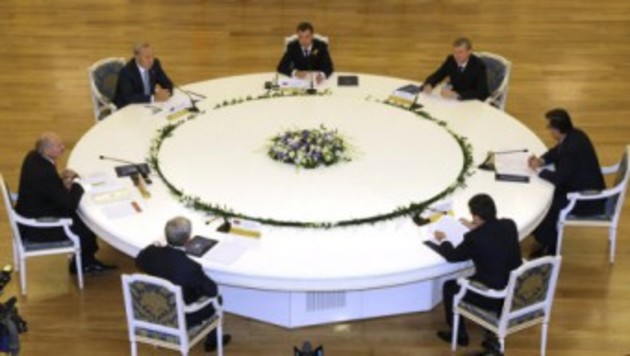On August 12 the informal summit of the states of the Collective
Security Treaty Organization begins in Astana. It will be an
interesting event. The president of Uzbekistan Islam Karimov came up
with the first surprise. He refused to go to Astana, even though no
documents will be signed at the summit. According to the general
secretary of the CSTO, Nikolai Bordyuzha, Karimov gave his consent at
a certain stage of preparation of the summit, but several days ago he
refused to participate.
Bordyuzha said that the summit's agenda is devoted to discussion of
the situation in Central Asia. Ahead of the summit he met with the
president of Russia, Dmitry Medvedev, and noted that extremist groups
had become more active in Сentral Asia. "A serious number of young
people are trained in Afghanistan and Pakistan. There is a threat of
terrorist invasion," Bordzhyua stated. He also stressed that some
states of the CSTO might need military support.
Apart from the Uzbek president, all the heads of state of the CSTO
will come to the summit: Russia, Kazakhstan, Tajikistan, Belarus and
Armenia. Alexander Lukashenko has already arrived in Astana, a meeting
is planned for him with Dmitry Medvedev . It will be their first
meeting after the economic crisis hit Belarus, which still has a
negative influence on the situation in the country. However, one more
interesting meeting will take place between Medvedev and Armenian
president Serge Sargsyan. It is expected negotiations on settlement of
the Armenian-Azerbaijani Nagorno-Karabakh conflict will be held.
After the meeting between Medvedev and the president of Azerbaijan
Ilham Aliyev in Sochi on August 9th, the meeting with Sargsyan should
answer the question about further Russian steps in mediating the
conflict between two countries. Medvedev is unravelling the knot of
misunderstanding between the parties, convincing his colleagues of the
necessity of agreement on the basic principles of a peace treaty. At
the trilateral summit in Kazan in June agreement seemed to be so
close, but Medvedev failed to reach it. Nevertheless, the Russian
president continues his efforts for positive results from the
discussion, which has been going on for more than 20 years.
Medvedev will tell Sargsyan about his conversation with Azerbaijani
president. As a result, analysts expect that there will be an
announcement about the next trilateral summit, which has to define the
basic principles of the settlement. It is not clear whether the
defined terms of the framework document will be changed or not, as no
details of the conversation between Aliyev and Medvedev were reported.
Russia received carte blanche for mediating and persuading the parties
from its partners in the Minsk Group of the OSCE - France and the US.
The fact that only Medvedev meets with the presidents of the South
Caucasian republics proves that the mediators have reached agreement
on the basic principles. Now the parties have to be convinced to
accept the plan of action, otherwise known as the road map.
One of the last strategic contradictions between the countries is
holding a referendum, which should define the status of the territory,
in Nagorno-Karabakh in the future. Considering the principle of
territorial integrity and recognition of the sovereignty of Azerbaijan
under Karabakh by the mediators, Baku insists that only a referendum
defining the level of self-government of the territory within
Azerbaijan is possible. Armenia is against such a definition.
Azerbaijan believes that holding the referendum on Karabakh's status
among Armenians only is equal to its loss and breaking the principles
of territorial integrity and international law. Baku cannot allow it.
The presidents probably discussed these aspects in Sochi and tried to
find new models, which meet the interests of both sides. Now the
discussion continues in Astana. The worst thing in the talks is that
the position of the Armenian president is unlikely to be softened, as
the situation in Armenia leaves much to be desired.
The Armenian opposition is demanding early elections, and any step
toward Azerbaijan in the sphere of Karabakh will be perceived as a
betrayal of the interests of the Armenians. In 1998 the first
president of Armenia, Levon Ter-Petrosyan, was deposed because he
called for an agreement with Baku. If he uses the same approach today,
Ter-Petrosyan could return to the position he lost.
Yevgeny Krishtalev. Exclusively to VK.
Conviction as a job

4375 views





